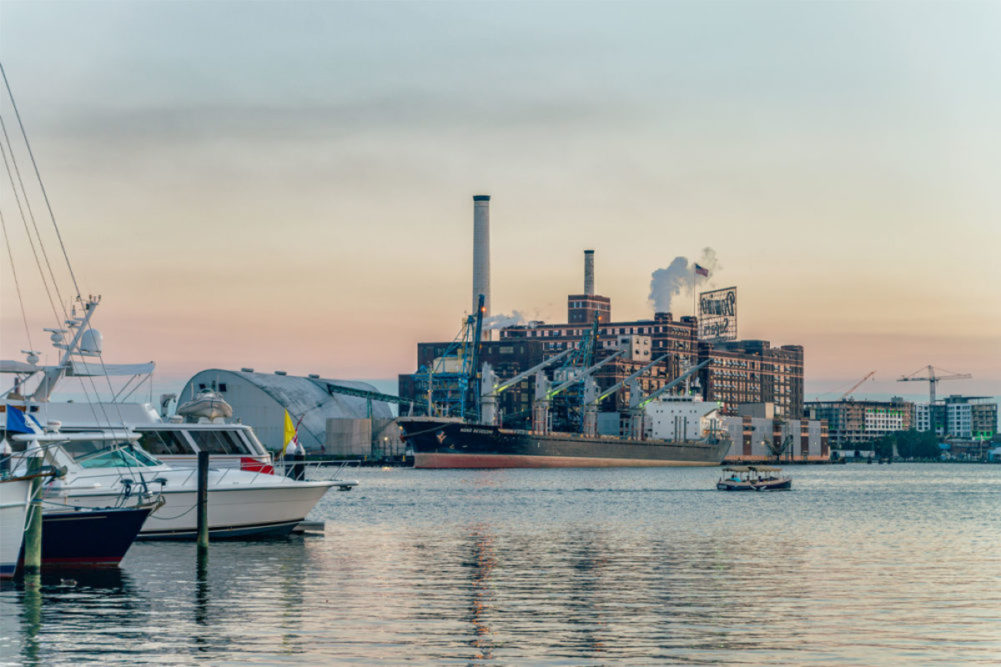BALTIMORE — All waterway vessel traffic was suspended indefinitely at the key US Port of Baltimore after a container ship hit the 1.6-mile-long, four-lane Francis Scott Key Bridge over the Patapsco River on March 26, causing the bridge to collapse.
“The Port of Baltimore is still open for truck transactions,” the Maryland Transportation Authority said. “Vessel (waterway) traffic into and out of the Port of Baltimore is suspended until further notice.”
Maryland Gov. Wes Moore declared a state of emergency because of the accident, as did Baltimore Mayor Brandon Scott. Six construction workers on the bridge at the time of the accident were unaccounted for and presumed dead the morning of March 27 as rescue efforts turned to recovery efforts. Two workers were rescued on March 26.
The Helen Delich Bentley Port of Baltimore is ranked as the 17th to 20th largest US port over the past few years, depending on the metric used. Data from IHSMarkit/PIERS showed 86% of exports were containerized and 14% bulk as of 2017, with imports split about 50%-50% between containers and bulk, of which sugar was by far the largest share of dry imports.
The port is a key location for the import of sugar used by the ASR Group’s Domino Sugar refinery located in the inner port in Baltimore. In a statement March 26, ASR Group said it did not expect an impact on sugar production at the plant in the short term.
“No short-term impact to our operations in Baltimore is expected,” ASR Group said. “The Baltimore refinery has six to eight weeks of raw sugar supply on hand with a ship currently discharging at the dock and another that finished unloading on Monday. Our network of production facilities and warehouses across the United States all currently have healthy inventories of finished products that can be utilized if necessary.
“We are deeply saddened by the tragic collapse of the Francis Scott Key Bridge in Baltimore and our hearts go out to the families and friends of the victims. We also commend the first responders who aided survivors and continue the search and rescue operation.”
The refinery is one of the largest in the US, producing about 6 million lbs of refined sugar per day (roughly 885,000 tons annually) under the Domino brand, equal to about 6% of total US sugar supply, all from imported sugar that comes into the Port of Baltimore. The company is the largest bulk importer in the port. Domino’s Baltimore sugar refinery opened in 1922 with the famous neon “Domino Sugars” sign erected in 1951. American Sugar Refining, Inc. (ASR) acquired Domino Sugar in 2001.
Logistics experts said much of the vessel traffic from Baltimore could be shifted to other East Coast ports, including New York/New Jersey, Norfolk, Va., and Philadelphia. Imports then would have to be transported by truck or train to their final destinations, which would add costs and create delays.
Trade sources said the impact on sugar and other import/export activity depends on how long the port will be shut down, which depends on how long it takes to remove debris from the collapsed bridge. Most agreed there would be a disruption to trade activity, even if not significant to sugar, with the greatest impact in the Baltimore region and along the US East Coast. Longer term, there could be intermittent disruptions as the bridge is rebuilt, which would take several years. There were no official statements giving a timeline.
A total of 622,245 tonnes of all types of sugar entered the US through the Port of Baltimore in 2023, according to US Census Bureau Trade Data and US Customs District Data, provided by the US Department of Agriculture’s Foreign Agricultural Service. Imports ranged from 460,496 tonnes to 663,627 tonnes between 2019 and 2022. According to USDA data, 9,129 tonnes of sugar from Mexico entered the US through the port in January (same as total for October-January) and 25,428 tonnes of high-tier imports from October through February. In 2022-23 (October-September), 105,976 tonnes of sugar from Mexico entered through Baltimore.
Top agricultural exports from Baltimore include meat, grocery items, soybeans, poultry, grain products (including flour), animal feed and other products. Top imports include sugar, coffee, soybeans, beer and ale, molasses and others.

